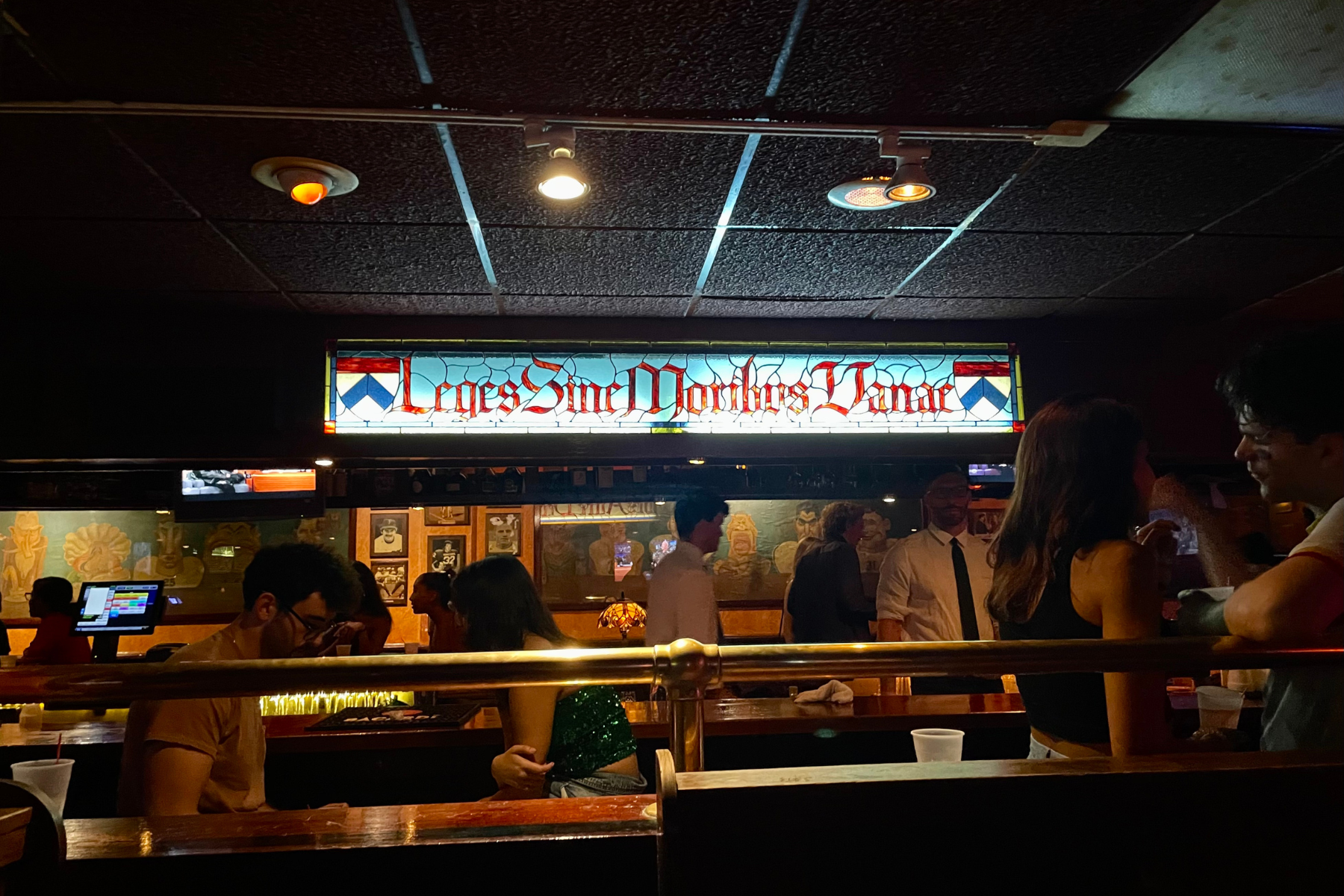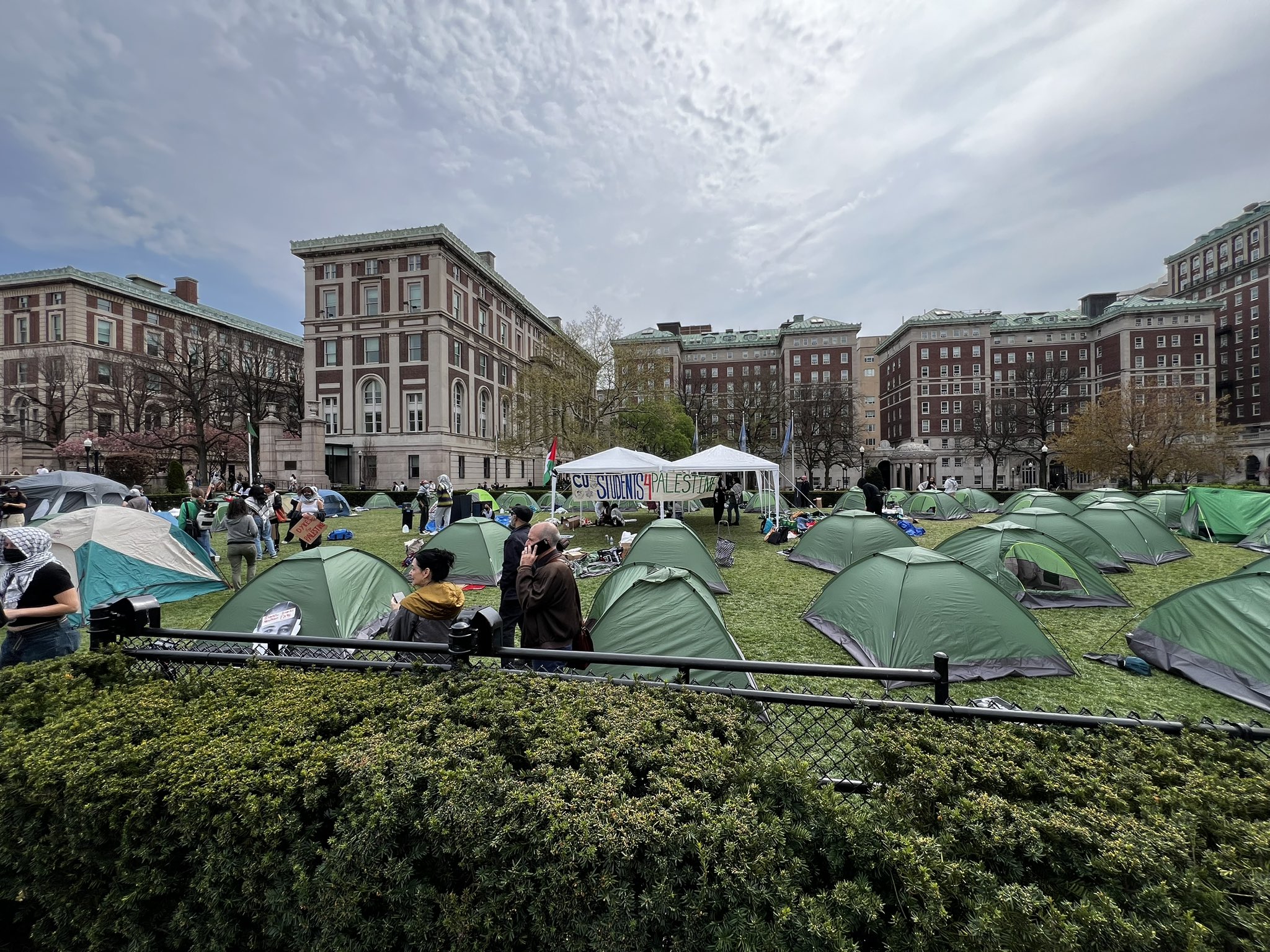On the Record | The chronic case of relativism plaguing the Ivy League.
Smokey Joe’s Bar, University of Pennsylvania / Photo credit: Lexi Boccuzzi
By Lexi Boccuzzi
It is hard to spend time around the University of Pennsylvania without encountering its motto, “Leges sine moribus vanae,” which translates to “Laws without morals are useless.” It can be found everywhere from a banner on our crest to a piece of stained glass above the bar at our beloved Smokey Joe’s.
Penn’s motto seems ironic, however, when reflecting on recent events. As anti-Semitism grew on campus following the terrorist attacks of October 7th, billionaire donors withdrew funds, and a viral congressional hearing led to the downfall of our president; it is hard to identify anything that resembles morals at Penn or any of its peer institutions. Conservatives have written this off as indicative of “moral rot” in the Ivy League or as a prime example of the dangers of progressive ideology. But this perspective misses the real issue—something much more antithetical to their mission—moral relativism. America’s most elite liberal arts universities have abandoned the basic tenets of classical liberalism.
Rather than embody any genuine principles, these institutions have militantly prioritized pandering to the political whims of the moment: remaining utterly inconsistent on free speech issues, publishing meaningless wordy statements, and discarding historical fact. When Representative Elise Stefanik (R-NY) asked Liz Magill and Claudine Gay to condemn calls for the genocide of Jews, this became clear. Their responses were jarring not because they were legalistic, but because they lacked humanity and were devoid of any internal consistency.
Both Magill and Gay had no idea what their employers stood for. Were their institutions champions of free speech? Did they see compassion as pivotal to their missions? Did they see the pursuit of truth as the most important human goal, as Harvard’s motto, “veritas” would have them? Despite what their resignations might suggest, Magill and Gay are not the only members of the Ivy League unable to answer these questions.
In his Wall Street Journal opinion editorial following December’s events, Harvard professor Harvey Mansfield argued, “Liberals want academia to reflect society, while conservatives know it has to rise above society.” He suggested that it is the act of honoring truth, not compassion and identity, that will garner Harvard respect. His assessment is accurate, but it overlooks the root of the Ivy League’s illness, that they have abandoned their self-proclaimed “liberal” values, notably truth and tolerance in favor of haphazard political appeasement.
It would be naive to wish for America’s elite institutions to become “conservative.” As a conservative myself, my disposition would likely not make me a successful academic. I am overly pragmatic and have a strong sense that my moral framework is the right one. Debating what is true is certainly less of a valuable enterprise when one relies on an absolute truth in one’s faith. Philosopher Leo Strauss put it when writing about liberal education, “conservatism is frequently characterized by distrust of reason or by trust in tradition.” In his opinion, liberalism is the best framework for a “virtuous” education. The people who want the ivory tower to stoop to society are not liberals, but fundamentally illiberal.
While an institution filled with solely conservative academics may not make for the ideal university, neither does one with the progressives who have a chokehold on the Ivy League. As Mansfield suggests, “honoring truth” is crucial to the mission of the university and its role in society. Strauss can help us understand this as well, “the greatest minds do not tell us all the same things… liberal education [therefore] cannot be simply indoctrination.” Traditional classical liberalism encourages the deliberation of various ideas in the public square, or the lecture hall, to determine what is true and good.
There are still rare settings where debate takes place on campus, as my professor Sophia Rosenfeld wrote in the New York Times when she explained the dialogue we had in her class “History of Free Speech and Censorship.” But as Penn’s motto would have us remember, these debates are dead without a moral underpinning. Ivy League students lack moral education which should be the focal point of a well-rounded liberal arts curriculum. This is not to say that we should be bringing back Victorian etiquette training or theology. Instead, exposure to philosophy, literature, and history can help teach empathy. Instilling open-mindedness in students when they first arrive on our campuses can help them honestly consider ideas rather than approaching any disagreement with hostility.
Recent events show the furthest consequence of this critical failure of modern universities. Students’ lack of historical literacy is demonstrated as they chant hateful slogans at their peers. When Claudine Gay was accused of plagiarism, academics rushed to her defense, redefining their most closely held value, academic integrity. It became more important to thwart the Republican activists who had accused her than acknowledge her very real misconduct. Should we redefine what is morally permissible in the name of politics? A society whose most revered institutions lack moral clarity will never be able to identify what is true.
With 54% of Americans claiming that the “state of moral values” is a very big problem, this seems to be trickling down from the ivory tower. This is accompanied by an ever-rising distrust of higher education. Alexander Hamilton famously said, “Those who stand for nothing fall for anything.” In efforts to appease all parties, Claudine Gay and Liz Magill both fell hard. As Penn looks for its new president, it seems they should remember that like laws, education without morals is also useless.
Lexi Boccuzzi is a senior in the College studying Philosophy, Politics, and Economics from Stamford, CT. Lexi is also the Editor-in-Chief and Founder of The Pennsylvania Post. Her email is abb628@sas.upenn.edu.




